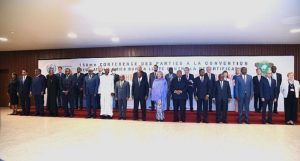Heads of State and Government meeting at the United Nations’ global conference on land have called on the international community to take urgent action to stem the loss of life and livelihoods that communities all over the world are experiencing due to the increasing and devastating impacts of desertification, land degradation and drought.

Speaking on Monday, May 9, 2022, at the Heads of State Summit convened ahead of the opening of the 15th session of the Conference of the Parties (COP15) to the United Nations Convention to Combat Desertification (UNCCD), Alassane Ouattara, President of Côte d’Ivoire, declared: “Our Summit must be one of hope, of the collective mobilization of States and development partners, in favour of land and forest restoration initiatives of our countries. We must use all the resources of our Conventions to meet the ever-increasing food needs and cope with the ever-increasing water stress of an ever-growing world population.”
Amina Mohammed, Deputy Secretary-General of the United Nations, said: “As we approach the halfway point of the Sustainable Development Goals, they remain our best hope to build a sustainable and inclusive future. The ground beneath our feet is the perfect foundation on which to build that future.”
Abdulla Shahid, President of the United Nations General Assembly, said: “Productive land is critical to global food security and healthy ecosystems, as well as to the maintenance of stable livelihoods. It is a precondition for the success of the 2030 Agenda for Sustainable Development; for progress on the Rio Conventions on biodiversity and climate change; and for tackling pollution on land and at sea.”
Ibrahim Thiaw, Executive Secretary of the UNCCD, said: “Now is the time for action. There is no future for our children or the planet if we continue with ‘business as usual’ when it comes to managing our land. COP15 is our moment in history, as the international community, to put people and the planet on a new course; on the path to life, to COVID-19 recovery and to prosperity. The decisions countries take at COP15 must be transformational, not incremental, to achieve land restoration and drought resilience the world longs for.”
The Summit concluded with the adoption of Abidjan Call, which urges giving the highest priority to the issue of drought and reinforces the commitment towards achieving land degradation neutrality by 2030. The leaders’ call to action comes in response to a stark warning by the UNCCD that up to 40% of all ice-free land is already degraded, with dire consequences for climate, biodiversity and livelihoods.
Business as usual will, by 2050, result in degradation of 16 million square kilometers (almost the size of South America), with 69 gigatonnes of carbon emitted into the atmosphere. But land restoration would help reduce the estimated 700 million people at risk of being displaced by drought by 2030.
During the Summit, President Ouattara also announced the ambitious Abidjan Legacy Programme to boost long-term environmental sustainability across major value chains in Côte d’Ivoire while protecting and restoring forests and lands and improving communities’ resilience to climate change, which will require mobilisation of US$1.5 billion over the next five years. Initial pledges made during the Summit towards this goal include those by the African Development Bank, the European Union, the Green Growth Initiative, and the World Bank Group.
At the top of the COP15 agenda are the restoration of one billion hectares of degraded land between now and 2030 and future-proofing people, their homes and lands against the impacts of disaster risks linked to climate change, such as droughts, and sand and dust storms.
COP15 is also expected to agree on policy actions to provide an enabling environment for land restoration through stronger tenure rights, gender equality, land use planning and youth engagement to draw private sector investment to conservation, farming, and land uses and practices to improve the health of the land.
During the Gender Caucus convened alongside the Heads of State Summit, the First Lady of Côte d’Ivoire Dominique Ouattara and the United Nations Deputy Secretary-General Amina Mohammed launched a new study on the differentiated impacts of desertification, land degradation and drought on men and women. The study shines the spotlight on the disproportionate impacts women and girls are facing when land is degraded and how, if given the agency, they can be at the forefront of global land restoration efforts.
Dominique Ouattara, First Lady of Côte d’Ivoire, said: “Women are the backbone of the rural economy, especially in developing countries. They represent almost half of the world’s farmers. We must at all costs win together in our quest to empower women farmers through various measures including land tenure security and access to rural finance.”
Amina Mohammed, Deputy Secretary-General of the United Nations, added: “Women and girls are central to building a land restoration economy. But they continue to be marginalised, and to pay the heaviest price when it comes to land loss, climate change, COVID and conflict.”
Over 2000 participants, including a dozen Heads of State and Government, some 50 ministers and high-level delegates are expected at UNCCD COP15, which is taking place from 9-20 May in Abidjan.
UNCCD COP15 is convening under the theme, ‘Land. Life. Legacy: From scarcity to prosperity’, a call to action to ensure land, which is the lifeline on this planet, will also benefit present and future generations.
UNCCD COP15 is the first of the three Rio Conventions meetings to be held in 2022, with Biodiversity COP15 and Climate change COP27 convening later on in Kunming, China and Sharm El-Sheikh, Egypt, respectively.
The High-Level Segment continues on May 10. The UNCCD COP15 formally opens on May 11 and is expected to adopt a set of decisions on these issues by the time it closes on May 20.
